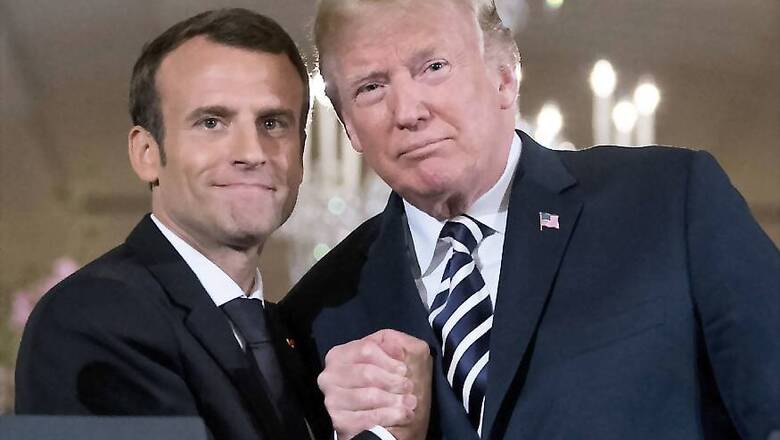
views
Paris: French President Emmanuel Macron sought to defuse a row with US counterpart Donald Trump on Saturday, hailing the "great solidarity" between their countries after Trump blasted his proposals for a European army. He also suggested that his remarks had been misinterpreted.
The two leaders held talks at the presidential palace in Paris ahead of World War 1 commemorations taking place in the shadow of a new nationalist surge worldwide. Their body language was less warm than during Trump's last trip to Paris in July 2017 and Macron's visit to the White House in April, underscoring a general cooling in relations which were further strained by a late-night tweet by Trump on defence.
Macron attempted to smoothe over the divisions, saying he shared Trump's view on the need for Europe to boost defence spending. "We need a much better burden-sharing within NATO," he said. Defending his call during the week for a European army, he said: "It is unfair to have European security being assured by the US".
Trump, who maintained an aloof bearing on arrival at the Elysee Palace but was visibly more relaxed after the talks, described himself and Macron as "very good friends". He said: "We want a strong Europe. It's very important to us to have a strong Europe.”
Trump's visit, which kickstarts two days of events marking the centenary of the end of World War 1 on Sunday, had looked set to be tumultuous after he fired off a tweet on arrival in Paris late on Friday, berating Macron's calls for a European army.
"President Macron of France has just suggested that Europe build its own military in order to protect itself from the US, China and Russia," the US president tweeted, referring to remarks made by Macron three days earlier. "Very insulting, but perhaps Europe should first pay its fair share of NATO, which the US subsidizes greatly!" he added.
Trump appeared particularly irked by the French leader's referral to the US alongside China and Russia as national security threats. In a French radio interview on Tuesday, Macron had referred to Trump's plans to pull the US out of a Cold War-era nuclear treaty and said a joint European Union force was needed to end Europe's reliance on US military might.
"We have to protect ourselves with respect to China, Russia and even the United States," he said after listing various threats including cyberattacks.
Macron's office on Saturday acknowledged that his remarks "could create confusion" but stressed: "He never said we need a European army against the United States."
A Macron adviser said that in his talks with Trump the French president emphasized the need for greater European autonomy on defence but said it was "not to the detriment of the US". The advisor said Trump had replied: "We are much closer than it seems."
The pair also discussed the killing of Saudi journalist Jamal Khashoggi and said pressure to elucidate his murder could help bring about a "political resolution" in Yemen, where Riyadh is fighting a brutal war against Iranian-backed rebels.
Trump and his wife Melania, who had lunch with Macron and his wife Brigitte, later cancelled a planned visit to an American military cemetery northeast of Paris due to bad weather, leaving them free for the afternoon. They will later join other world leaders for a dinner hosted by the Macrons at the Musee d'Orsay museum, ahead of Sunday's armistice commemorations at the Arc de Triomphe, where the Unknown Soldier is buried.
The events cap a week packed with symbolism, with memorials held across the world for a conflict that claimed around 18 million lives and involved more than 70 current-day nations. Macron, a centrist advocate of open borders, has repeatedly invoked the war in recent weeks to hammer home his message that rising nationalism is again destabilising the world.
On Saturday afternoon he will meet German Chancellor Angela Merkel in the northern town of Compiegne where the armistice ending the war was signed by the Allies and Germany in a forest clearing on November 11, 1918.
The visit is intended to symbolise the close ties between two countries that fought three wars between 1870 and 1945 but are now seen as the lynchpins of peace in Western Europe.
Trump has ducked out of a peace conference Sunday, which Macron and Merkel intend to use as a platform for promoting multilateralism. He and Macron struck up a warm relationship initially but have repeatedly clashed since over a growing list of issues, including Trump's decision to pull America out of the 2015 Paris climate accord and the Iran nuclear deal.
The WWI commemorations come at a watershed moment for the liberal post-war order, with anti-immigration populists at the helm in the US and Brazil, sharing power in Italy, and making strong gains in Germany, where Merkel has announced her resignation in 2021.












Comments
0 comment